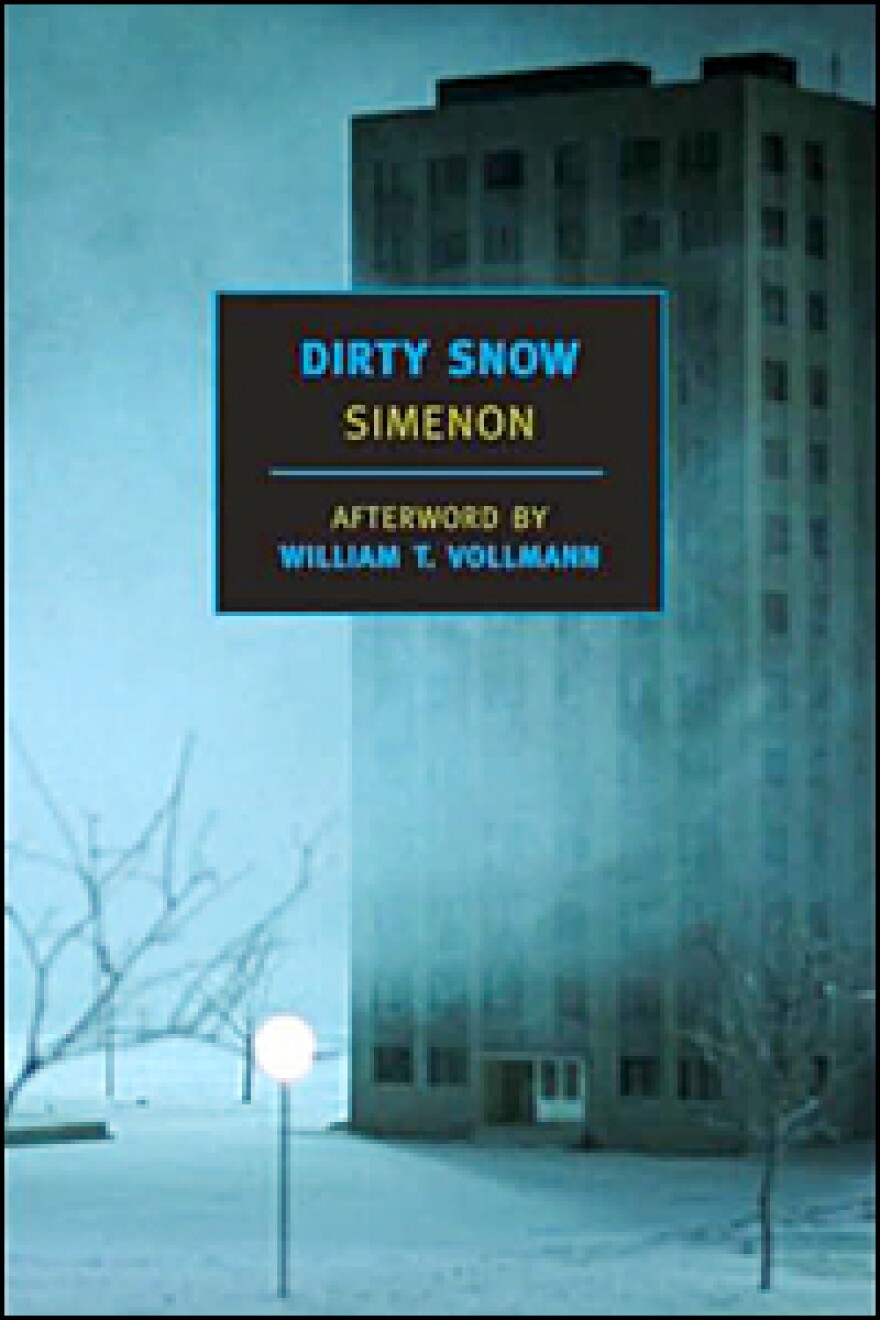
Call them buttonhole books, the ones you urge passionately on friends, colleagues and passersby. All readers have them -- and so do writers. This summer, NPR.org talks with authors about their favorite buttonhole books in the weekly series "You Must Read This."
Be warned: Georges Simenon's Dirty Snow is anything but the feel-good read of the summer. Anyone seeking a fresh helping of Fried Green Tomatoes or field guides to whomever you may meet in Heaven should most certainly look elsewhere.
Dirty Snow, a noir novel first published in 1946, is the chronicle of a low, mean, vicious soul spiraling toward certain doom for no good reason. Frank Friedmaier, an aimless amoral teenager living in a brothel run by his mother in Nazi-occupied Brussels, launches himself on a life of crime, beginning with the late-night fatal stabbing of a German officer. He then commits another murder -- of a former neighbor in his hometown rural village -- in the course of a petty burglary. He sexually victimizes and humiliates a young woman who lives next to his mother's flat,seemingly as punishment for her attraction to him.
Finally locked up for suspicion of a crime he didn't commit, Frank becomes something of a hoodlum ascetic, in the tradition later made famous by French writer Jean Genet in Our Lady of the Flowers. James Hynes, author of the 2003 satirical novel Kings of Infinite Space, discusses the hypnotic appeal of this saga of a very bad man living in very dark times.
Q. How do you recommend a book this bleak, especially in a literary culture that these days puts such a premium on self-affirmation?
A. What can I say? Dirty Snow is not escapist, it's not life-affirming -- at least not in the way Oprah books are -- and the main character is scum. On the other hand, the book is thrilling to read, purely on a narrative level, and even bracing, as you watch a master storyteller tell a difficult and complex truth, while hardly putting a foot wrong. It's not difficult or off-putting, just ruthlessly honest. But it's also wonderfully evocative and detailed and full of unforgettable characters. If dark, morally ambiguous stories about unpleasant and unlikable characters are such a hard sell, then why do people keep reading Macbeth and Lolita and The Aspern Papers, just to pick three favorites off the top of my head? Hell, why do people keep watching The Sopranos?
I'm not saying a story has to be grim to be literature -- I'm thrilled to see Elizabeth Bennett wind up with Mr. Darcy every single time I read Pride and Prejudice -- but a great book like Dirty Snow helps keep us all honest by reminding us that, yes, sometimes life sucks, we're all at least a little guilty of something, and yes, we are all going to die. So why not read about that at the beach?
Q. In that vein, Dirty Snow is often likened to Camus' The Stranger -- a similar tale of a young man plunged into a state of moral chaos.
A. In some respects, Dirty Snow is a better book than The Stranger: It's less cerebral and more visceral. I'll grant that Dirty Snow is much less elegant, but it's also more lifelike and much more tough-minded. The Stranger sometimes reads like it was meant to be taught in high school French classes, but any high school teacher who taught Dirty Snow would lose his or her job.
It's also a more memorable book, as least for me. Camus' Meursault isn't a fully realized character so much as he's a philosophical stalking horse; he starts out as a diffident young man and ends up as an existentialist philosopher. The scene where he kills the Arab on the beach is brilliantly executed, but basically he does it because the story requires him to. Frank Friedmaier, on the other hand, is a living, breathing, fully realized character -- contemptible, yes, but utterly believable at every point, and utterly unforgettable. The two murders he commits are as pointless and capricious as the killing of the Arab, but not for a second do you doubt his motivation for murder, or his capacity for it. The killings are a natural result of his stunted character, and the chaos of an occupied country. Both books come from the same Gallic shrug, which offers as your only redemption authentic self-knowledge, no matter how good or how rotten you are.
I love The Stranger, but it reads like a case study. Camus wrote it to propose a philosophy, while Simenon wrote Dirty Snow to tell a story, full of vivid characters and set in a flawlessly evoked milieu. Along the way, it invokes the same philosophy as The Stranger, but with more grit and complexity and humanity.
People like Camus were greatly influenced by American noir writing -- by some accounts, indeed, The Stranger was inspired by James M. Cain's The Postman Always Rings Twice. Do you see much of an echo here of any hardboiled American writers?
I don't know enough about Simenon to know if he was influenced by American noir. I do know that he wrote books like Dirty Snow throughout his career, calling them romans dur, or "hard novels," as an alternative to the Inspector Maigret novels. After reading Dirty Snow and a couple other of his noirs, I tried to read a Maigret and gave up after the first chapter; it was much more mechanical and formulaic. Simenon's noirs are the real deal, on the other hand, and I suspect that in years to come, they'll form the basis of his reputation, as a major practitioner of noir.
It's interesting to note that both noir and existentialism arise out of the same historical moment, and come to some of the same conclusions. At the very least, both traffic in a kind of godless fatalism, and I'd even argue that noir has ended up being the longer-lasting and more timeless expression of it. My B.A. in philosophy is pretty dusty after 30 years of neglect, so I don't know how seriously anybody takes Sartre and Camus anymore, but certainly James M. Cain, Patricia Highsmith, Jim Thompson and now Georges Simenon are held in much higher esteem these days than they were during their lifetimes.
Copyright 2023 NPR. To see more, visit https://www.npr.org.




